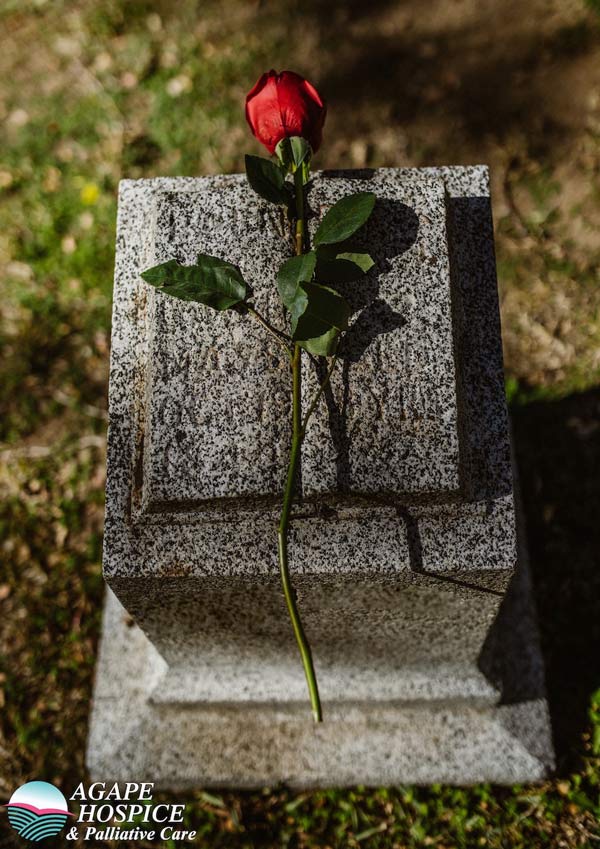10 Myths and Misconceptions About Grieving

Grief is complex and losing a loved one is often one of the most difficult experiences a person faces. Unfortunately, our culture’s discomfort and avoidance of death have created many myths and misconceptions surrounding grief. Part of Agape’s mission is to help increase the public’s understanding of the grieving process through our bereavement support. Recognizing these myths (and more importantly the truths) is the first step in embracing grief as a natural experience. Read on as we debunk 10 myths surrounding grief and share the truth.
MYTH: Grief has a timeline.
FACT: There is no set timeline to get over grief and be done with it. The grief process is a personal experience and is influenced by many factors.
Time may help diminish the intensity or frequency of grief and while “time heals all wounds” is a common saying, grief can come and go over a lifetime. (Often anniversaries or certain times of the year can reignite grief.)
MYTH: There are orderly stages of grief.
FACT: There is no set sequence to experience grief and no guaranteed stages.
The commonly known 5 stages of grief (denial, anger, bargaining, depression and acceptance) come from the book On Death and Dying, written by Dr. Kubler-Ross. Some people may go back and forth from denial, anger, and depression, repeating them. Some may not experience one of these at all. Even feeling acceptance at the loss of a loved one doesn’t mean you won’t later feel strong emotions of confusion or despair.
While these 5 stages are commonly experienced, they don’t encompass the entire grief experience, which is much more complex.
MYTH: There are right and wrong ways for a person to grieve.
FACT: There is no right or wrong way to grieve. Despite societal expectations around how you should “grieve correctly”, the truth is that everyone experiences the grief process in their own unique way. There is no one-size-fits-all experience for grief.
Some Healthy Ways to Cope With Grief Include:
- Remembering the deceased and writing down memories and feelings.
- Accepting support from friends and family.
- Expressing your emotions and crying when you feel like it.
- Getting plenty of rest.
- Eating healthy and exercising.
- Sticking to a regular routine.
- Seeking out bereavement or grief counseling if necessary.
MYTH: Ignoring the pain of grief will make it go away.
FACT: Ignoring the pain of grief and staying busy is a temporary solution. Sooner or later, the grief catches up with you. If you try to rush grieving and “just get over it”, it will create a difficult coping mechanism of avoidance. For true healing, it is necessary to face grief and actively deal with it.
MYTH: If you’re not crying, you’re not actually grieving.
FACT: Crying is not essential to grieving. Tears are a normal response to sadness, but it’s not the only way to express this emotion. Those who don’t cry might be grieving just as deeply but have other ways of processing it.
A state of numbness or shock is also common to the grieving process and may prevent people from crying. This is alright. No matter how much or how little someone is crying, it’s not proportional to how much they are grieving.
MYTH: Crying is a weakness.
FACT: Unfortunately in our culture there is a misconception that it is unacceptable or weak to cry. Of course, crying is a healthy response to grief and sadness for anyone, any gender, any age. Try not to repress the urge to cry as it can help you to physically process the emotions of loss and help to heal.
MYTH: The first year of grieving is the hardest.
FACT: While the first few months or the first year may be the hardest for some, it is not always the hardest for others.
Sometimes the second year can be more difficult. Perhaps related to the fact that initial support from others has likely lessened. Right after a funeral, the people in your life reach out often to check in but that is usually not the case as time goes on. Once again, the misconception of grief is that you’ll snap out of it after a period of time. Know that it is okay and normal to experience strong grief emotions in the following years and please remember to look after yourself. There are support groups always available and you can seek out counseling services at any time.
MYTH: Women grieve more than men.
FACT: Stereotypes have caused this myth to perpetuate that women grieve more but grief is not influenced by gender. Everyone grieves. The intensity of grief is intangible but can be impacted by the individual’s relationship with the deceased and the circumstances of death.
MYTH: Grief and mourning are the same.
FACT: Grief is an emotional state and mourning is an outward expression or action of grief.
When experiencing the loss of a loved one, grief is very personal and includes our inner thoughts and feelings. The emotions of grief can vary greatly from numbness to anger to deep hurt.
Mourning is how this grief is expressed visibly to others. Examples of mourning include: wearing black, tattooing a memorial to the deceased, bringing flowers to a gravesite, sitting shiva in Judaism, or other cultural traditions.
MYTH: Grief has an endpoint.
FACT: There is no time limit on grief or an endpoint. However, the passing of time does allow us to adapt to the loss of a loved one and develop a better understanding of how to cope.
As the book Tuesdays with Morrie, written by Mitch Albom, beautifully puts it:
“Death ends a life, not a relationship.”
Loss is a difficult part of the human condition and everyone experiences grief at some point. If you know someone who is grieving, remember to refrain from unsolicited advice and most importantly: listen to their feelings without judgment.
If you, yourself, are currently grieving then you should know that you are not alone. It’s important to be patient and honor the grieving process.
